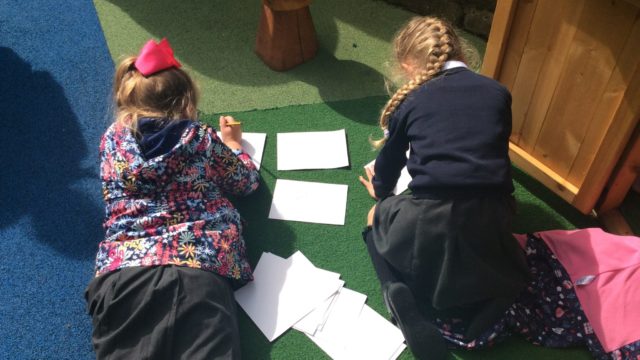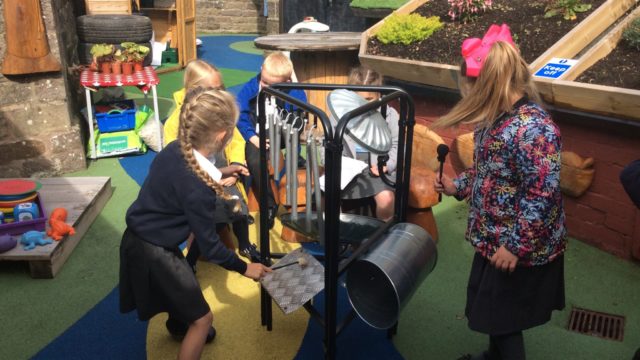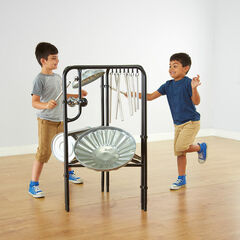How important is music on the primary curriculum?
With the teaching of music being high on the conversation agenda at the moment – in a recent Guardian article, they quoted a letter from a head teacher that read, “Music is a hobby, it is not a career. It will not be supported by the school. I will not allow children to leave school to take graded exams. We are only supporting children’s learning.” – we decided to take a look at how music can provide outstanding learning opportunities, perhaps even beyond those in a conventional maths, science or English lesson.
The Funky Junk Yard Outdoor Music Frame now takes pride of place in the outdoor space at Crich Infant School in Derbyshire. The children absolutely love it! Their teacher, Paige Farley, says they always make a beeline for it during their outdoor learning sessions.
Building life skills.
I went to have a look at the Funky Junk Yard in action at Crich Infact School. I was lucky enough to witness the children in the full flow of creativity. Not only were they well into their rhythm making, they were also in the process of developing their entrepreneurial skills. The children were setting up and promoting a show, writing and distributing tickets as well as rehearsing and drumming up hype for their audience. All of this was organic. It came from the children being allowed free access to the Funky Junk Yard in their outdoor learning time. This was only able to happen because their teacher is of the opinion that music provides children with so much more than instrumental skills.
Confidence.
Firstly, they had to decide to put on a show. My first thought was how good this resource is for helping to develop confidence and aspiration in children. I know that some of this has been instilled by the school and parents and guardians, but the Funky Junk Yard used in this way is fantastic. It allows for consolidating and building on this crucial skill and the ambition of performing in front of others. It may not have been a huge audience, but we can all appreciate the benefits of an intimate gig!
Building Cultural Capital.
Thinking about it from the audience perspective too, it gives children the experience and understanding of what a show is. Children learn how to behave at an event like this, all while building cultural capital, a lack of which often contributes towards the attainment gap in children. In future, when it comes to perhaps studying a play, all of those children will have a context in which to place a performance with an audience.
Writing Opportunities.

Children took it upon themselves to write invitations and tickets so their peers could attend their drum show.
To get an audience, you have to advertise your show and have tickets to monitor who attends. This provides some excellent real life writing opportunities where the children can really feel that their writing has a purpose. Using this with children older than Year 1 could lead to a whole media production unit. They could be taught about advertising, poster design and language choices, organising an event and the importance of practice to be ‘performance ready’.
Creative Self Expression.
Learning opportunities for music include the more obvious such as rhythm, volume, pitch and timbre. However, the Funky Junk Yard also gives children an outlet for expression. If a child is angry the Funky Junk Yard can provide a channel for those emotions in a non-destructive way. Equally, if a child wants to tell or understand a story, could they do this with sound to help them through the plot?
Sharing, team work, constructive criticism, drafting and rehearsing are also possible learning outcomes. Because the Funky Junk Yard is shiny, rather loud and not something children might ordinarily come across in school, it engages and enthuses, providing the perfect ingredients for learning. Watch the full video to see it all in action.
All in all, we are of the opinion that music is a crucial element in the primary curriculum. Without it, the school experience could lack vital experiences and creative outlets for children.
This article was written by our Social Media and Content Manager, Katie Addison, (former teacher of English), in collaboration with Paige Farley, Year 1 teacher at Crich Infant School in Derbyshire.





